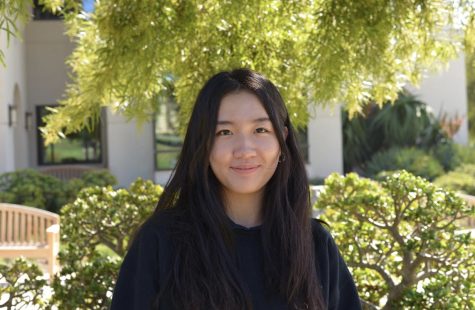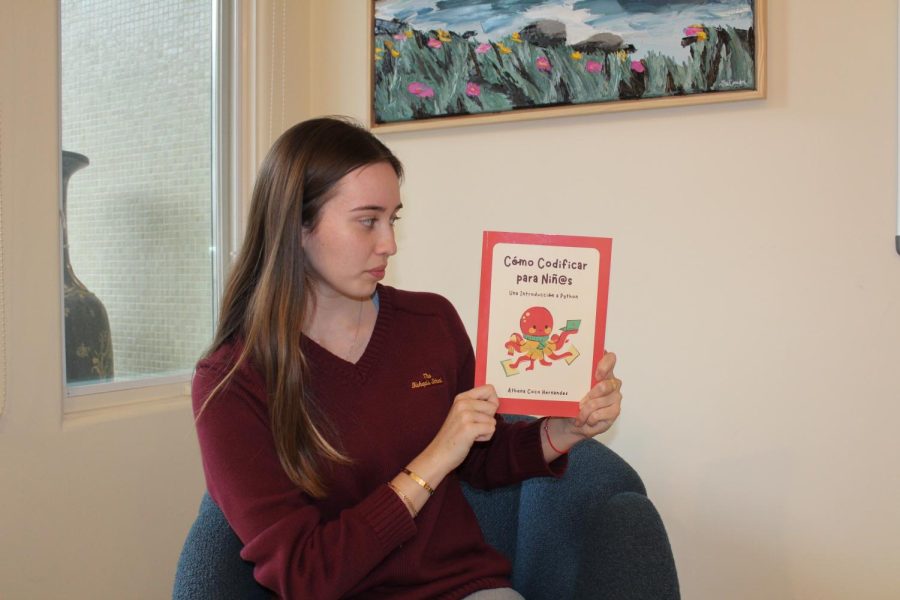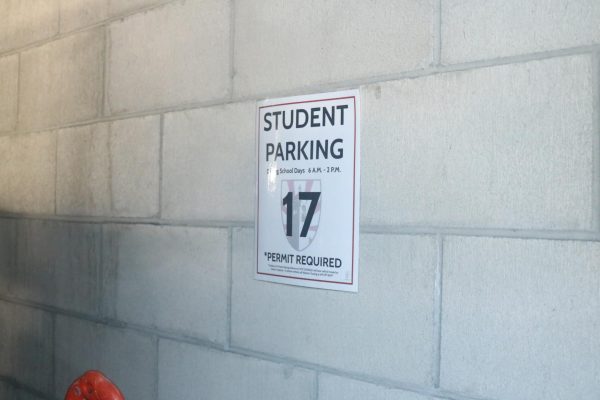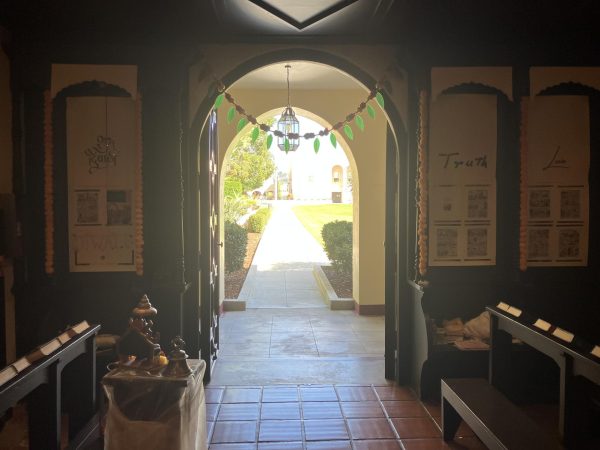Code with Coco: a Bishop’s Senior Shares her Computer Science Passion
“Como Codificar para Niñ@s,” Athena’s book that was published on October 15, 2022, totaled to 178 pages and aimed to teach youths about the intricacies of Python programming.
Among the 1.7% of students selected from over 91,000 applicants nationally, Athena Hernandez (‘23) was one of Bishop’s 2023 Coca-Cola Scholars Foundation Semi-Finalists alongside Katelyn Wang (‘23). Athena attributes this recognition as a result of creating “Codificar con Coco,” meaning “Code with Coco” (her middle name). Through years of online tutoring, a book publication, and ambassadorships and awards, she has been able to meaningfully support Latino students in education from lower socioeconomic backgrounds.
Since being awarded as a semi-finalist in the Foundation on November 9, 2022, Athena has spoken at numerous renowned organizations such as the San Diego Engineers Week Awards Banquet and the Annual National Computer Science Teachers Association (CSTA) conference. Additionally, she was selected as the top recipient of all California and Nevada applicants by the Hispanic Heritage Foundation. However, beyond all of her illustrious achievements and passionate efforts, Athena wants to, most importantly, tell her story and talk about the importance of computer science education for Spanish-speaking Latino youth.
She also emphasized her desire to help students at Bishop’s, especially Latinas and girls in general interested in computer science. “I’ve learned that in order to succeed, you need to be seeking out opportunities, not just waiting until they come,” Athena said. “Bishop’s has given me a lot of opportunities, but I hope to guide other students because there are a lot of things I would have done if I knew about them earlier.” From finding opportunities to speaking on podcasts to seeking mentors in renowned technological companies, she is open to chatting with anyone interested in applying for mentorships or awards earlier in their high school career!
The Coca-Cola Scholars Foundation states on its website that winners are selected “based on their academic excellence, leadership, and service demonstrated in school and community activities.” What project did you do for you to receive this recognition?
Firstly, I’m not sure if Coca-Cola looks at one project, but a main project of mine has been ‘Codificar con Coco,’ which translates to ‘Code with Coco.’ I had many resources from tutoring stored in Google Docs that I decided to compile into a book. I published a book called Cómo Codificar para Niñ@s (How to Code for Kids)—I continued using this book in my Python classes, but anyone around the world can buy the book and learn Python by themselves.
I think, holistically, the foundation likes to see leadership and involvement with someone’s community. And so, at Bishop’s, I’m involved as a leader in many clubs, including LASO, CSI, and CyberPatriot. On campus, I also participate in activities such as Speech and Debate and Orchestra. Off-campus, I’m working on a research project from my summer program at NYU.
I know that you have been interested in tutoring ever since co-founding Global Milestone, a Bishop’s online tutoring and cultural exchange initiative. So, how did your project, ‘Codificar con Coco,’ all begin?
First of all, about the name of my project, ‘Coco’ is my middle name—it is easier to say than Athena in Spanish. I would say my project got started in the middle of 10th grade. I was super interested in teaching students, especially Spanish-speaking students.
And yes, it was sort of a branch off of Global Milestone. Originally, I approached these students with the idea that I would be teaching them English. And although I did do that, and sort of continue to do that, through teaching coding, I realized that their math skills were really not up to what I had expected. As a person who grew up here in the United States, I would say that the school curriculum is pretty good—especially going into a private school like Bishop’s. But just in general, for public schools, you know, you still get to learn up to calculus if you chose to do so. However, when I looked at the [Spanish-speaking] students that are within the Mexico public school education, although heavily dependent on the specific area, is not up to US public education—I realized they’re having trouble with multiplication and basic algebra.
So, first of all, I wanted to work on that with them. Because computer science is really math-heavy, I realized: why shouldn’t I teach them computer science? Plus it’s something I really love and probably want to study in college. I began to teach them; it was more working through different math concepts, then translating them into code.
What’s your mission with your project? What impact would you like to leave with your project?
My goal started out with wanting to broaden Spanish-speaking students’ education. But I soon realized that I wanted to teach other skills like math and computer science to a larger diverse population. Because I’m in a very privileged situation, and I have the opportunity to do so, I realized that many other Hispanic or Latino students, particularly ones living outside the US and in Tijuana, don’t have that opportunity. In and outside of Bishop’s, I’ve always been the only Latino student in any of my programming classes, which is kind of concerning.
What were some of the roadblocks that you’ve encountered in your journey?
I really hoped to teach as many students as possible. I think I’ve taught about 50 or 60 students at this point, but I teach them for about one or two semesters and then I have to go on to the next student because I don’t have enough time to teach everyone one-on-one or in small groups. I think that means that my goal is to find more Spanish-speaking teachers, which is really hard for me because I don’t really know anyone else besides older people that I’m not very close with.
So I’ve actually worked with a software developer at Google, and her name is Janice Pan. She helped me sort of outreach to more students and teachers. So I’m still working on that. As for my book, I realized when I was trying to teach computer science to these students, that there were really no resources available, at least from what I could find on Google. And so having taken software development at school, web development, and then some Java classes outside of school and AP exam preparations, I had a lot of knowledge that I could use to translate these ideas into Spanish.
What are you focusing on right now or in the near future related to your project?
I’m still reaching out to libraries that could possibly hold my book, Cómo Codificar para Niñ@s. But I know the Bishop’s library and the La Jolla Riford library have my book, which is really cool. I’m also still working on reaching more communities in the southern San Diego area because that’s where there’s a more Spanish-speaking population. For Christmas, my father is helping me give away 100 books to my students so I’m really excited about that—it can enable them to sort of play around with something even if they don’t have me alongside them.
What does this recognition mean to you?
I’m honestly just really honored to have my work recognized at the national level. I, of course, everything I do, I deem really important, from my perspective, you know, being a leader of LASO and trying to teach the students computer science, and then my research that I work on… takes a lot of time. And I’m really, really happy. I’m really, really honored that someone else recognizes the amount of effort I put into my work.
I’m especially grateful to my dad. He has helped me; he works in Tijuana. And he knows a lot of families that have middle-school to high-school-age children. And so he’s helped my outreach efforts, and he’s helping me donate 100 books, which I’m really really grateful for.
How will you continue your work in the future? In college and beyond?
I will definitely teach in college because I really enjoy teaching so I don’t see why that would stop. There are also a lot of upcoming exciting opportunities for my students; I recently became a student ambassador for an organization called “TECHNOLOchicas,” which is basically “technology chicas” and “chicas” means girl in Spanish. And so they understand my concern for the students and they are really willing to help me promote the opportunity and give me opportunities to speak up.
I was also recently asked to participate in the CSTA Conference, which is a Computer Science Teacher Association National Conference. There I will talk about my book and the reason why it’s important to have Spanish language materials in computer science. Especially since Spanish is the number two language here in San Diego.
Congratulations are in order for Athena, and feel free to reach out to her to have a conversation about her accomplishments or if you have any questions. Keep on the lookout for an upcoming article about semifinalist Katelyn’s journey!

Crystal Li joined The Tower in her freshman year when she moved from Shanghai to San Diego in 2019. Now a senior, she fondly looks back on the four-year...






